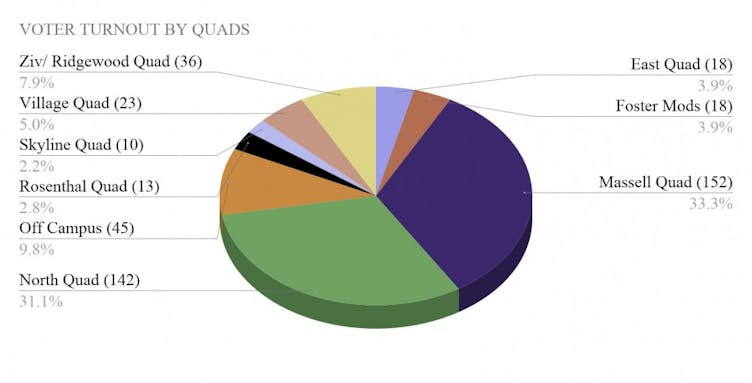Student Union election results bring in 17 new members
Of this election's 30 candidates, 17 prevailed. Their plans for their tenures in office follow.

SKEWED VOTER TURNOUT: The Class of 2023 had the highest participation in the election, while the Class of 2022 had the lowest.
Seventeen Student Union positions were filled on the Senate and Allocations Board in the first round of Union elections this academic year, which took place this Wednesday.
Five hundred seven people voted in the election, with 290 votes, or 57.2 percent, coming from the first-year class. The class of 2022 had the lowest turnout, with just 12.03% of the class participating.
Janice Huang and Skye Liu were elected as senators of the class of 2023. As newcomers to both the Union and the University, the newly-elected senators emphasized their abilities to convey the concerns of the first-year class to the Senate and to fight for their constituents, according to their candidate biographies.
Most of the newly elected senators declared that their top priorities would include improvements in facilities and strengthening community among their constituents. The senator for North Quad, Krupa Sourirajan ’23, said she would address water pressure and shelving space in showers, and will add more social spaces in the quad with the addition of hammocks, according to her candidate biography.
East Quad Senator Priyata Bhatta ’22 said she will focus on the frequent bug infestations in the residence halls, and Ziv and Ridgewood Quad Senator Sagar Punjabi ’21 will look into the lighting in Ziv common rooms and the number of laundry machines in the quads, per their candidate biographies.
Like Sourirajan and the Class of 2023 Senators, Senator for Off-Campus Students Alison Leibowitz ’20 said she will address the issue of community — specifically the loneliness often faced by off-campus students. "I want to help people like me who wish that there was more connection," she told the Justice in a Sept. 9 interview.
Myra Kraft Transitional Year Program Senator Erik Lambrecht ’23 said he plans to bridge the gap between Transitional Year Program students and the greater student body. He will strive to make sure TYP students’ “voices are heard amongst the rest of the Brandeis community,” he said in his candidate biography.
Joyce Huang ’22 ran uncontested for the Racial Minority senator seat. She said she plans to initiate an online anonymous confession box in which students are able to submit their concerns about campus race dynamics, create events catered towards students from cultures outside of the predominant ones that already have clubs and representation on campus, and make Asian clubs more inclusive toward students of south and southeastern Asian descent, per her candidate biography.
Emma Fiesinger ’23 and Jordy Pineiro ’23 were elected as the two-semester representatives to the A-Board. Both stressed the centrality of integrity and transparency on the part of the board in dealing with club funding. Pineiro’s first plan of action, he wrote in an email to the Justice, is the establishment of a grant encouraging clubs to do crossover events.
Rebecca Shaar ’21 ran unopposed for the three-semester representative to the A-Board seat. In an email to the Justice, she shared that at A-Board’s first meeting, which took place on Sept. 15, the emergency funding and international travel policies were amended to be more equitable and lenient. Shaar wrote in the email that A-Board “will be re-evaluating [its] funding policies throughout the semester to make sure they line up with our values of transparency, equitability, and consistency.”
Marshall Smith ’21 was elected to the two-semester minority seat of A-Board unopposed. Having served in this position last year, Smith said in his candidate biography that he is excited to begin his second term and “get back to work with the Allocations Board in creating a positive campus life environment.”



Please note All comments are eligible for publication in The Justice.